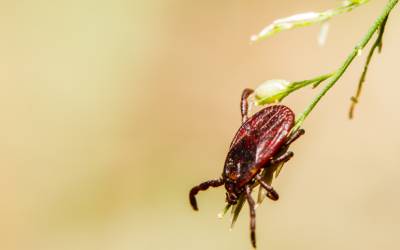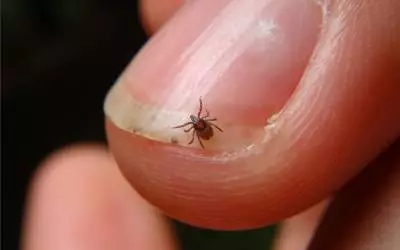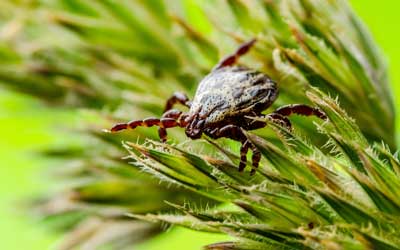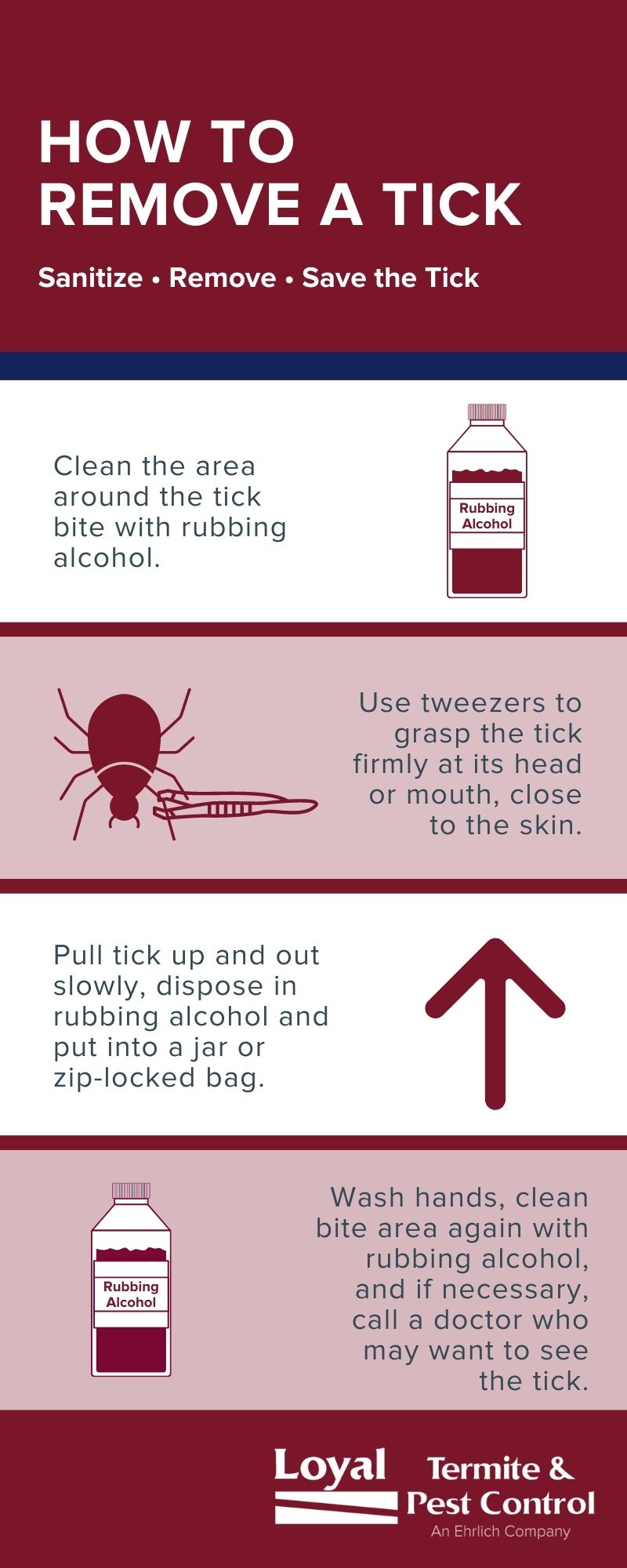 Ticks are notorious for spreading a variety of dangerous illnesses, but Lyme Disease is probably the most infamous among them. Over the last few years, this disease has only become more common throughout Virginia, so if you live in the area or plan to visit, it’s important to be aware of what Lyme Disease is, how it spreads, and how you can protect yourself.
Ticks are notorious for spreading a variety of dangerous illnesses, but Lyme Disease is probably the most infamous among them. Over the last few years, this disease has only become more common throughout Virginia, so if you live in the area or plan to visit, it’s important to be aware of what Lyme Disease is, how it spreads, and how you can protect yourself.
Do All Ticks Spread Lyme Disease?
Not all ticks spread Lyme disease. The primary species known to transmit Lyme disease-causing bacteria is the black-legged tick, also commonly called the deer tick. These ticks acquire the bacteria when feeding on infected animals like deer and rodents.
For a tick to transmit Lyme disease, it must first be infected with the bacteria. Then, it has to attach to a host long enough for the bacteria to enter the bloodstream, which can take quite some time. While any tick bite puts you at risk of contracting Lyme Disease, removing the tick as quickly as possible can reduce your risk pretty significantly.
Is Lyme Disease Common in Virginia?
Virginia’s climate provides an ideal environment for ticks to thrive thanks to the warmth and humidity, especially in the spring or summer. Since ticks are a common problem here, it makes sense that Virginia consistently ranks among the states with higher Lyme disease incidence rates.
While ticks have always been fairly common in our area, the number of reported Lyme disease cases has shown an upward trend over the last few years. But, that trend isn’t just limited to Virginia; across all of the United States, we’ve seen a nearly 70% increase in cases since 2022. This may be due to the warmer winters and increased deer populations, which provide ticks with the perfect conditions to thrive.
Signs of Lyme Disease
Lyme disease can get more severe the longer it is left untreated, which may even lead to debilitating or permanent health conditions. Being able to identify the earliest signs of the illness could help you seek treatment before it progresses. Signs of Lyme disease include:
- Bull’s-eye shaped rash
- Fever or chills
- Headache
- Neck stiffness
- Joint pain
- Swollen lymph nodes
How to Prevent Tick Bites
Taking proactive measures to prevent tick bites is key to reducing the risk of Lyme disease and other tick-borne illnesses. Here are effective strategies for tick bite prevention:
- Use Insect Repellent: Apply EPA-approved insect repellents containing DEET, picaridin, or oil of lemon eucalyptus on exposed skin and clothing.
- Wear Protective Clothing: When outdoors, wear long sleeves, pants tucked into socks, and closed-toe shoes to minimize exposed skin.
- Perform Tick Checks: After spending time outdoors, thoroughly check your body and clothing for ticks. Pay close attention to areas like the scalp, armpits, groin, and behind the knees.
- Modify Your Landscape: Create a tick-safe zone around your home by keeping lawns mowed, removing leaf litter, and placing a 3-foot-wide barrier of wood chips or gravel between wooded areas and lawns.
- Check Pets and Gear: Ticks can hitch a ride on pets and outdoor gear. Inspect animals and equipment thoroughly before bringing them indoors.
- Consider Tick Control Services: Professional tick control services can provide targeted treatments to reduce tick populations around your home and yard, helping to create a safer outdoor environment for your family.
Tick Removal Services in Virginia
At Loyal Termite & Pest Control, our expert team specializes in safe and effective tick control solutions, tailored to reduce the risk of tick bites around your home. With Lyme disease cases on the rise, it’s crucial to safeguard your loved ones against tick-borne illnesses. Contact Loyal Termite & Pest Control today to schedule a consultation.

 People often wait until it is too late to look into professional pest control services. No matter what pest you’re dealing with, trying to take care of an infestation on your own can be tricky. If you don’t approach it the right way, you could end up allowing the pests to multiply without any signs of slowing down. Many DIY strategies fall far short of a long-term solution, and improper use of professional pest control products by untrained individuals can lead to serious health risks.
People often wait until it is too late to look into professional pest control services. No matter what pest you’re dealing with, trying to take care of an infestation on your own can be tricky. If you don’t approach it the right way, you could end up allowing the pests to multiply without any signs of slowing down. Many DIY strategies fall far short of a long-term solution, and improper use of professional pest control products by untrained individuals can lead to serious health risks. Attention, dog lovers in the beautiful state of Virginia! Are you tired of playing a never-ending game of hide-and-seek with ticks? While it may seem impossible to keep these blood-sucking pests away, with the right precautions you can help your furry friends avoid itchy bites all summer long. Read on to learn expert tips from the tick exterminators at Loyal Termite & Pest Control.
Attention, dog lovers in the beautiful state of Virginia! Are you tired of playing a never-ending game of hide-and-seek with ticks? While it may seem impossible to keep these blood-sucking pests away, with the right precautions you can help your furry friends avoid itchy bites all summer long. Read on to learn expert tips from the tick exterminators at Loyal Termite & Pest Control. The end of summer might seem like the start of a stretch of pest-free living, but this is often far from the case. Several kinds of pests actually thrive in or are even built for the conditions of the late summer here in Eastern & Central VA. If you want to secure pest-free living situations for the last portion of your summer, you have to take consistent and targeted efforts to discourage bugs and wildlife from hanging out around your property. Read on to learn about common late summer pests and what you can do to stop them with our expert exterminators at Loyal Termite & Pest Control!
The end of summer might seem like the start of a stretch of pest-free living, but this is often far from the case. Several kinds of pests actually thrive in or are even built for the conditions of the late summer here in Eastern & Central VA. If you want to secure pest-free living situations for the last portion of your summer, you have to take consistent and targeted efforts to discourage bugs and wildlife from hanging out around your property. Read on to learn about common late summer pests and what you can do to stop them with our expert exterminators at Loyal Termite & Pest Control! There’s not much creepier than finding a tick trying to lodge itself in your skin. However, the real danger associated with ticks is the potential for Lyme disease. Hiding in the dark corners of shaded woods and dense vegetation, ticks lurk waiting for the time to sneak up on potential hosts, possibly infecting them with bacteria that will lead to serious long-term ailments. To keep yourself safe from ticks and their diseases, it’s crucial to learn about their habits so that you can confidently keep away. Read on to learn more about ticks and Lyme disease in Eastern & Central VA with the tick exterminators at Loyal Termite & Pest Control!
There’s not much creepier than finding a tick trying to lodge itself in your skin. However, the real danger associated with ticks is the potential for Lyme disease. Hiding in the dark corners of shaded woods and dense vegetation, ticks lurk waiting for the time to sneak up on potential hosts, possibly infecting them with bacteria that will lead to serious long-term ailments. To keep yourself safe from ticks and their diseases, it’s crucial to learn about their habits so that you can confidently keep away. Read on to learn more about ticks and Lyme disease in Eastern & Central VA with the tick exterminators at Loyal Termite & Pest Control! Staying aware of
Staying aware of 
 Entomologists from Loyal’s parent company, Rentokil Provide their Pest Predictions for 2021
Entomologists from Loyal’s parent company, Rentokil Provide their Pest Predictions for 2021 It’s likely you are spending more time outdoors than ever this year. You’d also likely enjoy your outdoor living space more if you didn’t have to deal with pest problems! Pests may enjoy the Virginia summertime weather as much as you do, but that doesn’t mean you have to share your space with them.
It’s likely you are spending more time outdoors than ever this year. You’d also likely enjoy your outdoor living space more if you didn’t have to deal with pest problems! Pests may enjoy the Virginia summertime weather as much as you do, but that doesn’t mean you have to share your space with them. At Loyal Termite & Pest Control, we understand how distressing and uncertain times are right now during COVID-19. We are closely monitoring the COVID-19 situation to stay educated and to keep up-to-date. As always, our focus is our dedication to the safety and health of our communities here in Henrico and Richmond VA. With new information on the hour, there are endless questions surrounding the nature of the virus, including how it is spread. As of now, there is no evidence or proof to suggest that mosquitoes and ticks transmit coronaviruses. These two insects are certainly responsible for some of the world’s worst diseases, but COVID-19 is not one of them.
At Loyal Termite & Pest Control, we understand how distressing and uncertain times are right now during COVID-19. We are closely monitoring the COVID-19 situation to stay educated and to keep up-to-date. As always, our focus is our dedication to the safety and health of our communities here in Henrico and Richmond VA. With new information on the hour, there are endless questions surrounding the nature of the virus, including how it is spread. As of now, there is no evidence or proof to suggest that mosquitoes and ticks transmit coronaviruses. These two insects are certainly responsible for some of the world’s worst diseases, but COVID-19 is not one of them.